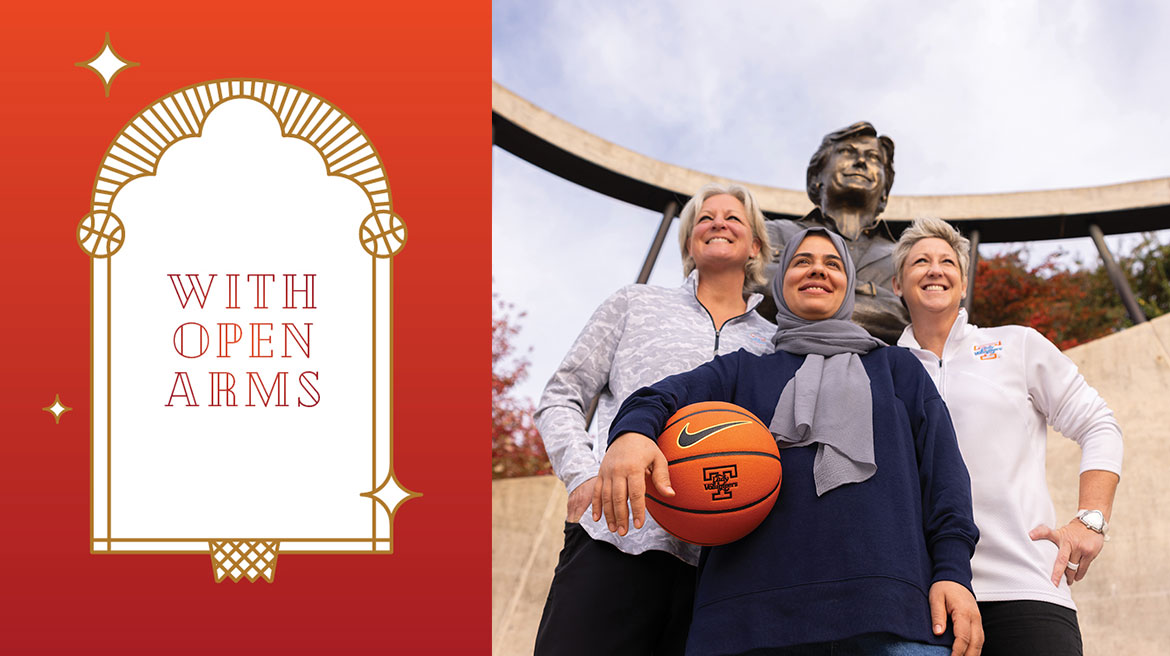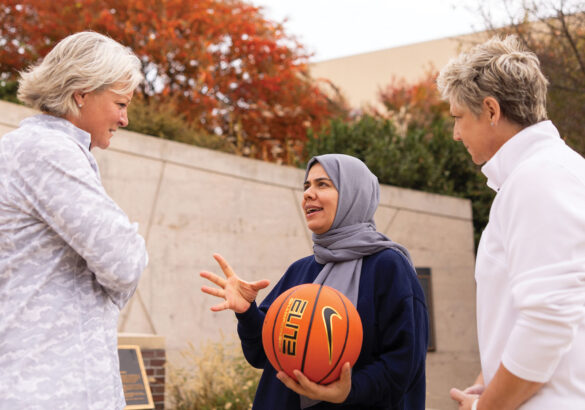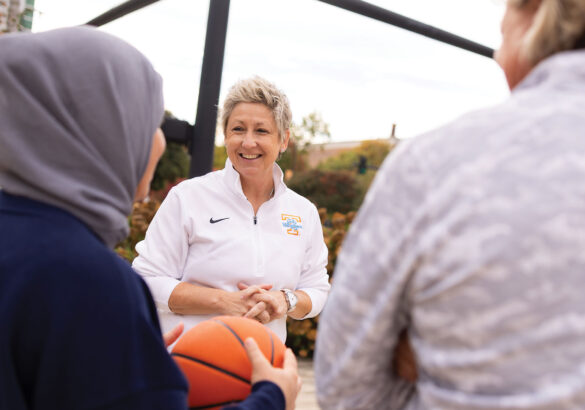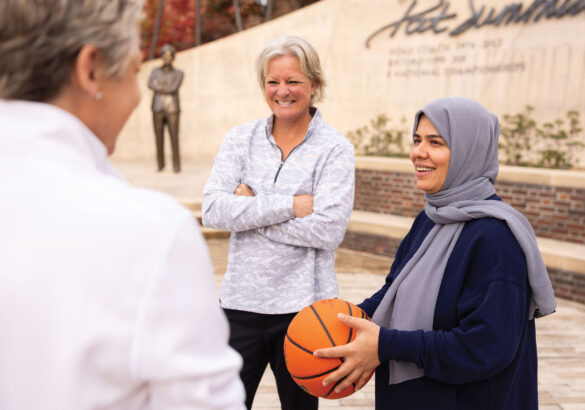Sarah Hillyer (’10) and Michelle Marciniak (’96) know a thing or two about what it means to lift up and empower women.
After all, they both learned from the legendary coach Pat Summitt, who spent her career pushing for women’s rights on and off the basketball court. So it’s no surprise that when a group of Afghan women needed aid in resettling after fleeing from the Taliban, the two women stepped in to help.
Twenty-nine women had found a safe harbor in Albania after the Taliban took over Afghanistan in August 2021. The extremist faction began persecuting women who were used to enjoying certain freedoms.
“I always said it was their love of basketball and their pursuit of education,” Hillyer says. “Michelle was like, ‘Yeah, but you’re missing the most obvious one. Their other crime is that they’re women.’”
According to Al Jazeera, the Taliban began cracking down on women’s rights in 2022, banning women from universities and shutting down schools for female students after sixth grade.
Hillyer had gotten involved in resettlement efforts after being contacted by Mara Gubuan, founder of the Equality League, which trains athletes to advocate for access, equality, and safety. With the help of the International Federation of Association Football (FIFA), Gubuan and former Afghan National Basketball Team captain Samira Asghari were able to move the 29 women to Albania.
Gubuan knew of Hillyer’s work empowering women and girls around the world through UT’s Center for Sport, Peace, and Society and the US Department of State, and she hoped Hillyer could help the group of refugees.
Marciniak—who helped lead Summitt’s Lady Vols to their 1996 national championship and went on to play professionally in the Women’s National Basketball Association—had met Hillyer when they worked together on a documentary chronicling girls playing basketball in Iraq and how Summitt had influenced them. When she heard that Hillyer was going to Albania to work with young women displaced by the Taliban, she wanted to help.
“What she was doing really moved me internally in the way that she was just trying to go there and give some hope and some peace to the Afghan women,” Marciniak says.
The trip to Albania was spent on the court and getting to know the women and documenting their stories. Their goal was to share these stories with people in the United States to raise awareness and encourage them to take action.
After Hillyer and Marciniak returned home, the next phase of the project was getting the women to America. They decided Knoxville made the most sense as a location for the women to live.
“Being a woman, wanting to play basketball, and getting your education— there’s no place in the world that should stand up more for the rights and the hope and the freedom for these young women than us at the University of Tennessee, because of Pat Summitt’s legacy and her commitment to women’s basketball, the power of education, and developing strong young women,” Hillyer says.
Marciniak and Hillyer worked closely with Gubuan to get the refugees to East Tennessee, but it was not an easy process.
Thanks to Equality League’s efforts and work with the International Office of Migration, 13 of the Afghan athletes received sponsorships that allowed the women to come to the United States—but that was just the beginning.
Once they arrived, the women needed housing and jobs, as many of them send money back to their families in Afghanistan. And of course many wanted to pursue an education—one of the reasons they were forced to flee their own country.
“There’s a sense of urgency to get a job, but there’s also this deep desire to get an education,” Hillyer says. “I think the next year for us is going to be about job placement but also raising funds and mobilizing partners to provide opportunities for degrees and scholarships.”
The center has worked with Knoxville’s Bridge Refugee Services, which helps refugees resettle by assisting them in securing housing, household items, and social services.
“I always wanted to be on that stage as a teacher, and it just slipped through my hands like water. Maybe one day my daughter will get to be a teacher.”
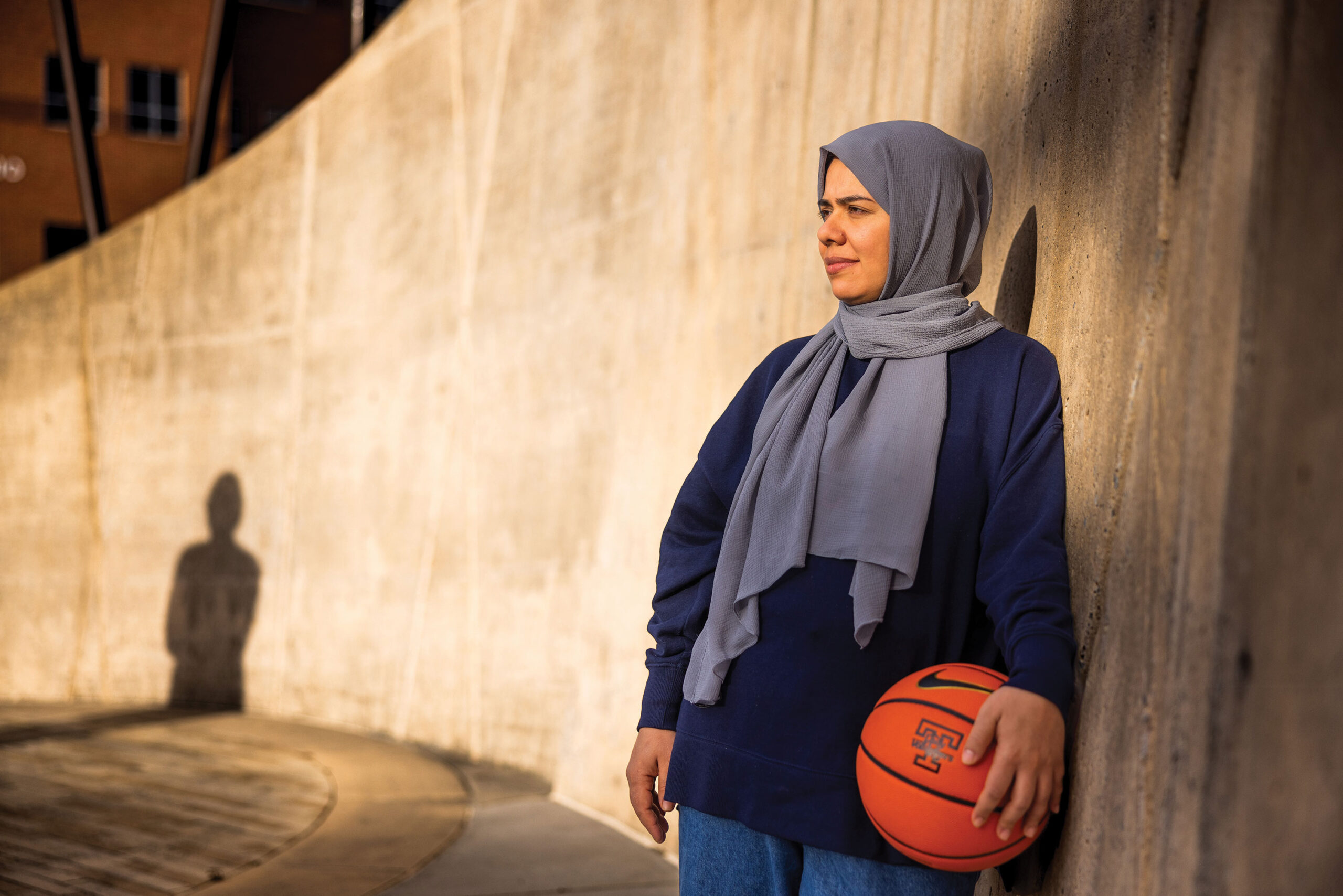
Malalai Anwari was a point guard on the Afghan national women’s basketball team and taught public administration at one of the country’s largest universities before the Taliban takeover in 2021. She was able to flee the country to Albania and then, with the help of UT’s Center for Sport, Peace, and Society, come to the United States. A few of her basketball teammates have not been as lucky. Anwari says she misses her home country and fondly remembers her time in front of a classroom.
The women have also been afforded opportunities to begin their education at UT through classes at the English Language Institute, which offers intensive academic English programs as well as part-time and night and weekend English courses.
Several have already completed their first term at the institute, with ambitions to work toward graduate degrees.
“It’s very important for us to learn English,” says one of the refugees who studied at the English Language Institute. “If I want to find a job in America, I have to learn English. I have to understand English. I have a lot of dreams and goals, so I have to reach my goals and dreams. I think English is the key.”
Marciniak says the way people have embraced the women has been incredible. “Seeing the community just make them feel like humans, make them feel like people really love them,” she says. “Their arms are wide open and wrapped around them as they get their bearings over the next couple of months. I have faith in humanity because of this.”
Over the next few months, the women will begin participating in exhibition basketball games and tournaments in the area to raise awareness of what is going on in Afghanistan and mobilize volunteers to help with getting more and more women to America.
Luckily for Hillyer, Marciniak, and Gubuan, they are working within a community inspired by Summitt, who fought hard for women’s rights and knew the value of helping others.
“She had this saying, ‘You win in life with people,’” Marciniak says. “Sarah and I are approaching this movement with the Afghan women the way Pat approached life.”

